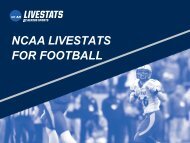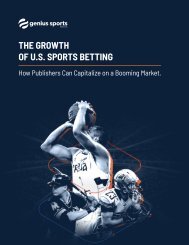In Focus Series: Prevention By Design Report
Genius Sports Media
Genius Sports Media
- No tags were found...
Create successful ePaper yourself
Turn your PDF publications into a flip-book with our unique Google optimized e-Paper software.
PREVENTION<br />
BY DESIGN<br />
Putting Consumer Safety at the<br />
Heart of Gambling Brands’ Online<br />
Campaigns & Media Buying
FOREWORD<br />
Simon Mukerjee, Global Partnerships Director, Genius Sports Media<br />
ABOUT THE EVENT<br />
<strong>In</strong> this, the first event of the new Genius Sports Media <strong>In</strong> <strong>Focus</strong> <strong>Series</strong>, experts<br />
discussed how the betting and gaming sector can prevent an inevitable backlash<br />
against online marketing by addressing the consumer protection challenges –<br />
including media buying at scale – head on.<br />
SPEAKERS<br />
Christie Dennehy-Neil<br />
Head of Policy and Regulatory Affairs,<br />
<strong>In</strong>ternet Advertising Bureau (IAB)<br />
Fiona Palmer<br />
CEO,<br />
GAMSTOP<br />
Gambling – and the marketing services industry<br />
that supports it – finds itself in the middle of a<br />
perfect storm of political, media and public scrutiny<br />
across the world. Problem gambling is a matter<br />
being treated with increasing seriousness by<br />
governments and for marketers and their suppliers,<br />
this is compounded by a broader concern over<br />
digital platforms and their effect on social and<br />
individual wellbeing. So it is not an easy time to<br />
promote a pastime which for the vast majority<br />
of its consumers provides harmless excitement,<br />
entertainment and enjoyment.<br />
opportunity for brands and digital marketing<br />
partners like Genius Sports Media to act together<br />
and promote best practices in responsible<br />
marketing – before the spotlight falls on us.<br />
The first event of our new <strong>In</strong> <strong>Focus</strong> series sought<br />
to highlight the reality that creating a safe and<br />
sustainable digital advertising ecosystem for<br />
the vast majority that enjoy gambling, but that<br />
mitigates against exposure to vulnerable audiences<br />
and minors, is not only the right thing to do but is<br />
simply good business.<br />
Christie Dennehy-Neil is Head of Policy &<br />
Regulatory Affairs at IAB UK – the industry<br />
body for digital advertising with over 1,200<br />
members engaged in all forms of online and<br />
mobile advertising, including media owners<br />
and advertising technology businesses.<br />
She works with the sector, both in the UK<br />
and at EU level, to achieve the optimal<br />
policy environment to support a sustainable<br />
future for digital advertising and to help<br />
boost the understanding of digital media<br />
and its benefits within regulatory and<br />
political circles.<br />
Fiona Palmer is CEO of GAMSTOP, the<br />
UK’s national online self-exclusion scheme<br />
which has been running as a multi-operator<br />
solution since April 2018. She has worked<br />
in the online gambling industry for the past<br />
10 years, most recently as Director of Social<br />
Responsibility at the RGA.<br />
Previously she headed up the Compliance<br />
Team at Sky Betting & Gaming where her<br />
passion for social responsibility led her to<br />
become a leading advocate of a number of<br />
cross industry steering groups.<br />
Restrictions on gambling advertising are almost<br />
inevitable, but the extent to which it impacts our<br />
sector remains within our control to some degree.<br />
But only if we can demonstrate collectively that<br />
self-regulation can work and that tightening<br />
regulations or banning certain types of advertising<br />
is unnecessary.<br />
Public and regulatory scrutiny has, to date, largely<br />
focused on TV campaigns and brand sponsorships.<br />
Yet digital marketing is by no means immune.<br />
We need to recognise we have a window of<br />
<strong>In</strong> the age of data-driven personalisation, we must<br />
harness the tools, technology and expertise at our<br />
disposal to ensure, as far as possible, that online<br />
campaigns are not served to minors or problem<br />
gamblers and that appropriate imagery and<br />
language are used at all times.<br />
A self-regulated and proactive approach to<br />
protecting these demographics, and the reputation<br />
of our sector, is key. As our expert panel rightly<br />
pointed out, it is incumbent on us all as an industry<br />
to demonstrate we can achieve that goal.<br />
Leanda Trethewey<br />
Head of Marketing,<br />
Sky Betting & Gaming<br />
Leanda Trethewey is responsible for driving<br />
the marketing strategy of one of Europe’s<br />
largest betting operators in an increasingly<br />
competitive and regulated market.<br />
Head of Marketing for Sky Betting &<br />
Gaming since 2017, Leanda has over 15<br />
years’ experience in digital marketing,<br />
communications and branding across a<br />
variety of sectors.<br />
Samit Dutta<br />
Head of Digital,<br />
PlayOJO<br />
Samit Dutta is an experienced digital<br />
marketing professional with over 15 years’<br />
experience working across a variety of<br />
industries.<br />
He is currently Head of Digital at PlayOJO,<br />
the fair casino, where he has been since its<br />
launch at the beginning of 2017.<br />
Simon.Mukerjee@geniussportsmedia.com<br />
PAGE 2 PAGE 3
Why is responsible digital advertising<br />
such a big issue for the gambling sector?<br />
Christie: <strong>In</strong>terest in gambling advertising is to some extent a<br />
microcosm of the increased scrutiny of digital advertising more<br />
broadly. Regulators are extremely interested in it. There is strict<br />
guidance already for gambling advertising, which was updated<br />
earlier this year to give marketers much clearer direction to ensure<br />
that they’re targeting more responsibly and that the creative and<br />
messaging is also appropriate.<br />
We know the UK government is looking at issues relating to gambling<br />
in general and advertising goes hand in hand with that. There’s a<br />
new House of Lords committee looking at gambling harms and I’m<br />
sure advertising will fall under that. It’s often on the political radar<br />
because it’s an issue where you<br />
get a lot of cross-party agreement<br />
about potential risks and harms.<br />
I think there’s a really good<br />
opportunity for marketers and<br />
brands to show that they take these<br />
issues seriously and that they are<br />
taking action to ensure that their<br />
marketing is responsible.<br />
Leanda: This issue isn’t going to<br />
go away. It’s inevitable that more<br />
regulation will come at some point.<br />
As operators we have to think<br />
innovatively about how we operate<br />
differently in that context, so there’s definitely a need for innovation that<br />
allows us to get ahead of future regulation.<br />
We have to think differently about advertising and how we talk to<br />
consumers. They want their bookmaker to act and they want to be able<br />
to trust them. So I think that will encourage all operators to behave<br />
differently in terms of how they communicate and advertise.<br />
<br />
<br />
‘This issue isn’t going to<br />
go away. It’s inevitable<br />
that more regulation will<br />
come at some point. As<br />
operators we have to<br />
think innovatively about<br />
how we operate.’<br />
5% – growth in<br />
online advertising<br />
spend in 2018 in<br />
the UK<br />
Source: IAB UK<br />
2018 IAB/PwC Digital Adspend<br />
Study<br />
PAGE 4 PAGE 5
ASA <strong>Report</strong>: Harnessing new technology<br />
to tackle irresponsible gambling ads<br />
targeted at children – April 2019<br />
Using new monitoring technology in the form<br />
of child ‘avatars’ - (online profiles which simulate<br />
children’s browsing activity) - to identify ads that<br />
children see online, the ASA collected data on<br />
the 10,754 times that ads were served to the<br />
child avatars (ad impressions) across 24 children’s<br />
websites and 20 open-access YouTube channels.<br />
<strong>In</strong> total, it found:<br />
<br />
Gambling ads were served to the child avatars on 11 of<br />
the children’s websites monitored<br />
<br />
23 individual gambling ads were seen by the child<br />
avatars on those 11 children’s websites a total of 151<br />
times – 1.4% of the total ad impressions<br />
<br />
No gambling ads were served on any of the openaccess<br />
YouTube channels included in the research<br />
<br />
https://www.asa.org.uk/news/harnessing-new-technology-gambling-ads-children.html<br />
PAGE 6 PAGE 7
How are you approaching the issue<br />
of responsible online marketing?<br />
Samit: The three things that I can boil it down to are restriction,<br />
verification and messaging. We are trying to restrict players through<br />
ad tech and analysing player behaviour to prevent us from marketing to<br />
at risk players or younger players. With verification, we want to be able<br />
to completely prevent any form of marketing to the wrong audiences,<br />
which includes working with providers and platforms in particular. <strong>In</strong><br />
terms of messaging, instead of being a tick-box exercise, it has become<br />
one of the first things we look at when we<br />
launch a campaign, so that safer gambling<br />
messaging is embedded throughout.<br />
<br />
<br />
Fiona: GAMSTOP has proven that<br />
the industry can come together, work<br />
collaboratively and deliver uniformity.<br />
We have well over 97,000 users<br />
registered within the scheme right now. They are being actively<br />
blocked from being able to gamble, so the next natural step is to use<br />
this collaboration to take it to the next level – we need a more holistic,<br />
uniformed approach which includes marketing. The individuals<br />
registered on GAMSTOP don’t want to see marketing from gambling<br />
operators and they shouldn’t be seeing it from those operators who<br />
are integrated with us. However if operators don’t know someone’s<br />
on the register because they’re not a customer of the operator, how<br />
do they know not to market to them?<br />
‘The three things I can boil<br />
it down to are restriction,<br />
verification and messaging.’<br />
97,000+ – no. of<br />
users registered<br />
with GAMSTOP<br />
today<br />
Source: Fiona Palmer, CEO,<br />
GAMSTOP<br />
September 2018<br />
Leanda: For us, it’s about starting with the consumer. We have a<br />
responsibility to take care of people in a vulnerable position, ensuring that<br />
we don’t target or talk to those people in the wrong way. We’ve invested<br />
a lot of time and effort in integrating a system we call ‘Signal’. This gives<br />
us the ability to automatically feed self-exclusion lists through to big ad<br />
platforms, so that people administering the campaigns know that they’re<br />
not going to target self-excluded customers. Now we’re making an active<br />
choice about which platforms we work with on that basis, so ideally we<br />
want to work with digital platforms where we can have first-party data<br />
integration and know that we have confidence around self-exclusion.<br />
The other thing is just about being stringent around age-gating. There are<br />
varying degrees of confidence with the platforms around not targeting<br />
teens. We’ve actually stopped working with some platforms based on a<br />
low level of confidence because we’re not comfortable, and when we’ve<br />
restarted we’ve actually started at +24 because we’re still not wholly<br />
comfortable about the +18 targeting.<br />
PAGE 8 PAGE 9
What are some of the proactive steps<br />
we could be taking as an industry?<br />
Samit: From a player safety point of view, up until a year ago we were<br />
using blacklists which were manually checked every four weeks or<br />
so. We actually got called up by the ASA and I’m extremely glad we<br />
did because it changed the way we operate. At the time I believed<br />
we were advertising in the safest way possible, but it turns out we<br />
weren’t. So what we’ve done now is move to a complete whitelist<br />
model whereby we use category restrictions and then we do manual<br />
checking on all of the sites that get moved onto that whitelist. We’ve<br />
really reduced the amount of inventory discovery we do so we can<br />
keep a handle on what’s happening and it prevents us from getting<br />
onto unsafe sites.<br />
Another major thing we’re trying to do is embed player safety<br />
knowledge across multiple functions. So take the development team<br />
and the marketing team – they might be completely different skillsets<br />
but both teams need to know what is responsible and what isn’t,<br />
so that safety checks are made at every step.<br />
Fiona: Over the past year, we’ve been learning from the data we’ve<br />
received from the consumers who register with us and the data we<br />
receive from thousands of websites to see how we can positively identify<br />
an individual but at the same time enable operators. Currently we have<br />
about 20% of operators integrated, they cleanse their data on a regular<br />
basis to proactively block marketing. We are improving our systems to<br />
enable all operators to be able to do that in<br />
an efficient manner. It’s our intention that by<br />
1st April 2020, all operators will be checking<br />
their databases against our register in order<br />
to proactively prevent marketing to all<br />
registrants of GAMSTOP.<br />
Leanda: <strong>In</strong> general, the way we advertise will<br />
evolve, we’ve seen some of it already, it’s<br />
moving more towards brand-led space rather<br />
than promos and offers space. A lot of the<br />
time in this sector it’s a race to the bottom in<br />
terms of promotions. It’s pleasing to see that<br />
people connect with consumers in a different way on more of a brand<br />
responsibility level and I think that’s something that will definitely grow.<br />
<br />
<br />
‘It’s pleasing to see that<br />
people connect with<br />
consumers in a different<br />
way on more of a brand<br />
responsibility level and I<br />
think that’s something that<br />
will definitely grow.’<br />
24% – increase<br />
from 2015 to<br />
2018 in spend of<br />
gambling ‘paid for<br />
advertising’<br />
Source: <strong>In</strong>terim Synthesis<br />
<strong>Report</strong>, July 2019<br />
‘The effect of gambling marketing<br />
and advertising on children,<br />
young people and vulnerable<br />
adults.’<br />
PAGE 10 PAGE 11
Does the industry need to<br />
start collaborating more?<br />
What role can the major online platforms<br />
like Facebook and Google play?<br />
Fiona: Our next target is to look at how we can enable responsible advertisers to actually<br />
stop advertising to self-excluded customers. As I say the big challenge for our team is<br />
we’re dealing with licensed entities by having operators integrated with us. Broadening it<br />
to the plethora of advertisers means we need to learn how we do that securely. Are there<br />
other sectors that we can learn from? I don’t think it’s efficient or will help consumers if<br />
we do it on a one-by-one basis. We need to do<br />
this collaboratively, taking a holistic approach,<br />
working with people from outside of our industry<br />
learning from them and their best practices.<br />
Leanda: I think there’s a real opportunity for<br />
collaboration with digital marketing. We’re<br />
all ploughing our own furrow but we have to<br />
come together as a group of operators to tackle<br />
these things together. It’s easy to see this as a<br />
big issue and a huge challenge when actually<br />
there’s a really big opportunity for us to work<br />
<br />
<br />
‘There’s never been a better<br />
opportunity to say “we’re<br />
acting responsibly to tackle<br />
this”, so we have to see<br />
this as an opportunity to be<br />
proactive, working together<br />
to find solutions.’<br />
collectively together to demonstrate what’s happening in this space. There’s never been<br />
a better opportunity to say ‘we’re acting responsibly’ to tackle this, so we have to see it as<br />
an opportunity to be proactive, working together to find solutions instead of waiting for<br />
things to happen to us. Sharing data around vulnerable customers is vital and there should<br />
definitely be a stronger culture of ‘test and learn’, and sharing those learnings amongst<br />
operators so that we operate more effectively for the benefit of the consumer.<br />
Christie: We all understand that in order for our industry to survive, we need to deal with<br />
challenges collaboratively to get the right solutions. The government aren’t experts in this<br />
area. They don’t know a lot about digital advertising and they don’t understand it because<br />
that’s not their background or area of expertise. The more that we can explain to them what<br />
we’re doing and demonstrate that it’s effective, by talking to them about measures like<br />
whitelists and age-gating, it demonstrates that we’re managing it properly. It’s important<br />
that if there are going to be regulatory interventions, they’re evidence led, which in lots of<br />
aspects of digital advertising there is quite a high risk that they aren’t. Don’t underestimate<br />
the value of educating regulators and governments so that the factors are properly<br />
understood. The risks for people who struggle with gambling are high, but that’s not the<br />
majority of the population, so it means that you need to design your solutions proportionally.<br />
Samit: When I moved into this industry I found it refreshing that there<br />
were open conversations with the ad platforms - rather than being<br />
dictated to. You’re involved and can have adult conversations about<br />
what’s happening and you have the ability to dictate your own future.<br />
For us, we get face time with Google and they’re receptive to what we<br />
have to say. With Facebook we struggle because our spend might be<br />
lower, but if we act collectively, as an industry, it would allow smaller<br />
operators to have their opinions heard.<br />
Leanda: With Facebook, they’ve been slightly behind the curve in<br />
understanding how they respond to this stuff. We’ve been helping<br />
them with how they approach responsible gambling – not just from an<br />
educational perspective but from what we need the platform to be able<br />
to do to give us the confidence to be able to keep using it. The challenge<br />
is we’re all doing that separately as businesses which puts pressure<br />
on limited resources so it’s about how we have a joint approach.<br />
Collectively we’re spending a lot on these platforms so we have a lot of<br />
weight if we do it together rather than us working in silos.<br />
Christie: From my experience, these platforms are well aware of this<br />
regulatory scrutiny; I think we’re pushing at an open door, as clients it’s<br />
absolutely right that you guys are driving this. You need to be confident<br />
advertising on these platforms and if you’re not, you don’t spend there<br />
and that’s exactly how it should be. That’s what governments and<br />
regulators want to see – you being a responsible brand. There’s an<br />
interesting challenge to work out how you can use data responsibly and<br />
securely, because on the one hand you’re trying to do the right thing,<br />
but also there’s challenges around how you’re permitted to use data.<br />
Even using data for exclusion can inadvertently become problematic and<br />
potentially not comply with the law.<br />
<br />
<br />
‘Collectively we’re spending a<br />
lot on these platforms so we<br />
have a lot of weight if we do it<br />
together from a commercial<br />
perspective, rather than us<br />
working in silos.’<br />
PAGE 12 PAGE 13
FOR MORE INFORMATION<br />
Simon.Mukerjee@geniussportsmedia.com<br />
@geniussportsmedia<br />
geniussportsmedia.com<br />
contactus@geniussportsmedia.com















